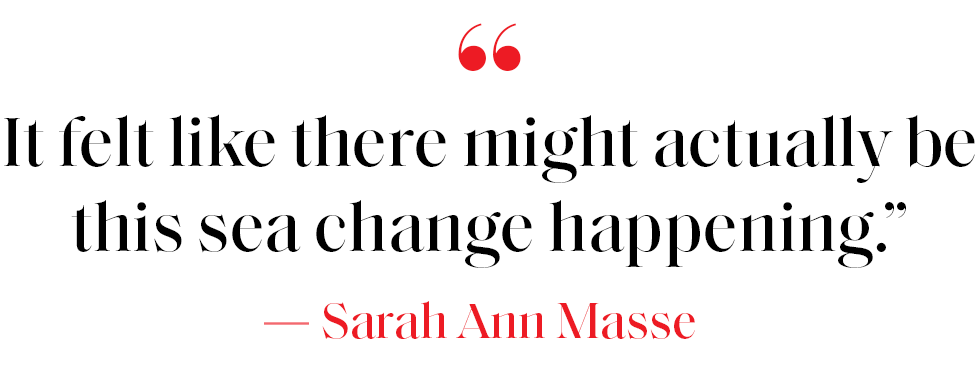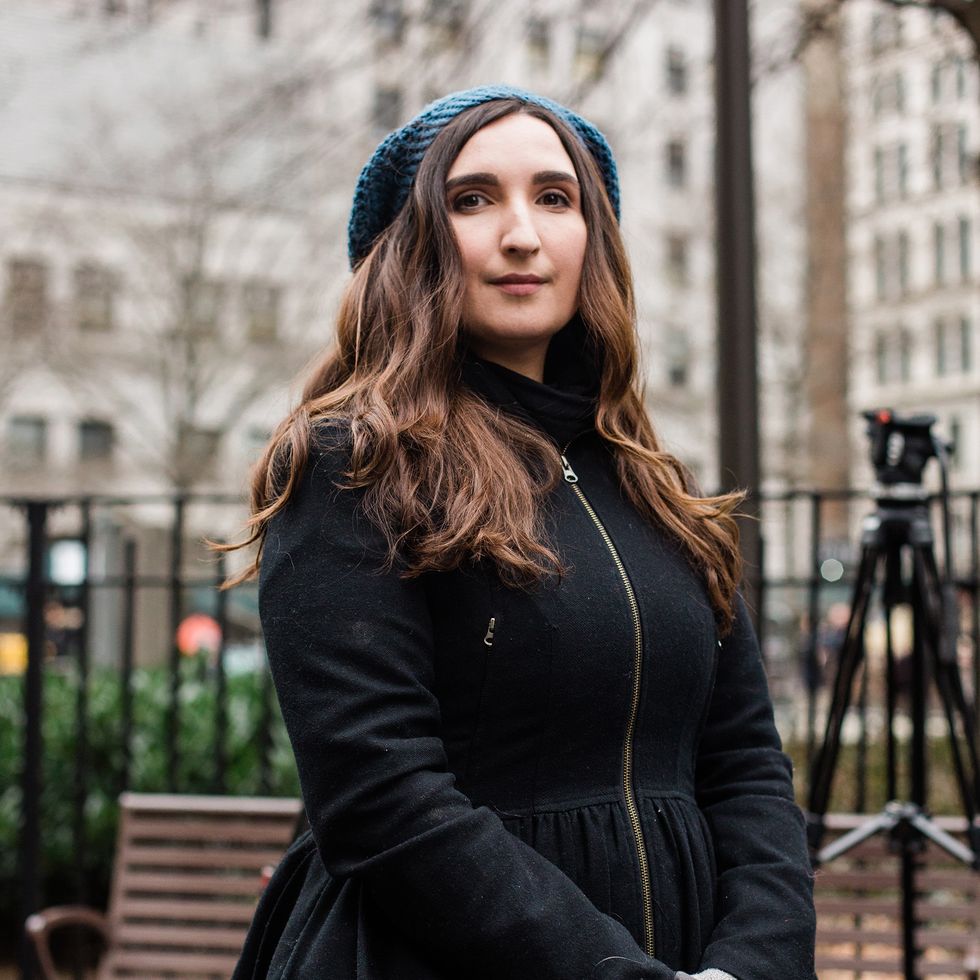In 2017, the Weinstein investigation and #MeToo movement shook the world. Where does the industry stand today?
When actress Sarah Ann Masse saw the New York Times’ investigation of Harvey Weinstein, published five years ago this October, her heart dropped into her stomach. For the first time since Weinstein had interviewed her in his underwear to be a nanny for his children in 2008, pulling her into a tight hug and telling her he loved her, she learned she was not alone. “I saw the first story and started thinking, Well, maybe now I can talk, maybe now I can tell my story, and my career won’t be destroyed,” she remembers.
She told her story in Variety at the time and ended up joining the class action lawsuit against Weinstein, who has since been sentenced to 23 years in prison in New York and faces further charges in Los Angeles. “I was most fearful about retaliation,” Masse says. “And in those first couple of months, after people started coming forward with their stories about powerful abusers, there was a general sense of support and understanding and community. It felt like there might actually be this sea change happening.” Days after the Weinstein article was published, the hashtag #MeToo, citing the phrase originally coined by activist and abuse survivor Tarana Burke in 2006, went viral. By October 2018, it had been used on Twitter more than 19 million times, often accompanied by testimonials of sexual violence.
Masse had moved to Los Angeles from New York the year before to audition for film and television projects. She had been getting about four auditions a month—“not bad when you’re starting out in a new market,” she says—but within a few months of going public about Weinstein, she saw those numbers dwindle. “I got a call from someone at the time saying essentially, ‘Casting directors are calling me. They’re angry. They want you to stop. I don’t know what you’re saying on Twitter. It’s got to end. You came forward; just be done. It’s enough,’” Masse recalls.
In the five years since, she estimates she’s been on just six auditions. “I was really shocked by it, because I thought things were changing. But then there was also that sense of, ‘See, this is exactly what I thought was going to happen.’”
What Masse has experienced is emblematic of an industry very much in transition. On the one hand, the Times’ investigation undeniably sparked a reckoning; the man who she says assaulted her is in prison, and countless other abusers in Hollywood and elsewhere have been fired or have resigned from their powerful perches. Nationwide, there have been steps to expand sexual harassment protections and to end forced arbitration and nondisclosure agreements, making it possible for more survivors to come forward. “The thing people forget about the Weinstein investigation is that it’s about work,” says Jodi Kantor, who co-authored the investigation with fellow Times reporter Megan Twohey. “These women were actresses, assistants—his own employees. They wanted opportunity. For some, it was their first day on the job. And he seized on their ambition, their newness to the field, and used it. That is the biggest social change we’ve seen: greater realization and consensus that workplace predation is wrong.”
But the retaliation Masse has endured—the casting directors who fear hiring women like her because they’re “difficult,” i.e., more likely to report wrongdoing when they see it—also shows there is work to do. Despite the public declarations of action and accountability, Masse says, the system continues to privately protect abusers and punish survivors.
To gauge what workers at all levels in Hollywood think of the progress that has been made in the past five years, ELLE partnered on a survey with the Hollywood Commission, an organization dedicated to stopping discrimination, harassment, and abuse in the industry. The commission, chaired by Anita Hill, was co-founded by entertainment executive Kathleen Kennedy, entertainment lawyer Nina Shaw, and entrepreneur and activist Freada Kapor Klein.
Forty-five percent of the nearly 800 people working in Hollywood who responded to the survey—93 percent of whom identified as female, transgender, or nonbinary—believe that high-profile people engaging in harassment are more likely to be held accountable for their actions today, compared with five years ago. But conversely, 55 percent believe that colleagues will “rarely” or “never” take responsibility for problematic behavior. And while half believe “moderate” progress has been made overall, 73 percent of respondents said leaders place a “low” or “medium” priority on addressing sexual harassment.
In the epilogue to Kantor and Twohey’s book She Said, which gives a behind-the-scenes look at the Weinstein investigation, they write, “If the story was not shared, nothing would change. Problems that are not seen cannot be addressed.” In other words, the articles for which they won the Pulitzer Prize (along with Ronan Farrow and The New Yorker) would simply not exist without the bravery of the survivors who banded together and leaped into the unknown. “In the months after the Weinstein story broke, it was amazing to see how many women were prepared to go on the record with their own accounts of abuse and harassment,” Twohey says. But even she and Kantor have noticed a chilling effect in the years since: “Five years later, as the #MeToo movement has suffered a backlash, there’s no question that the calculation [for anyone considering speaking out] has become more complicated.”
For Dani Ayers, the CEO of Me Too International, the organization she founded along with Tarana Burke to further Burke’s original mission of ending sexual violence, centered on marginalized communities, the challenge has been keeping the focus on systemic issues as opposed to whatever case is making headlines. “We have been living in the shadow of the Hollywood reckoning, and it’s been a challenge to get out from behind it,” Ayers says. “I read a headline at the end of the Amber Heard and Johnny Depp trial that said, ‘The Death of #MeToo.’ So because that trial resulted the way it did, that somehow means our work is dead? We really have to fight against the misconception that this work is contingent on one or two or three people, or just about bringing down powerful men.”
She sees evidence that the culture is shifting, pointing to the mainstreaming of conversations around consent, bystander intervention, healing, trauma—even the widespread use of the term “survivor” instead of “victim.” Overall, Ayers says, there is “more willingness by the public and by institutions to think about the issue of sexual violence, instead of sweeping it under a rug and ignoring that it’s there. We are paying more attention. It’s not something that we’re going to turn a blind eye to anymore—and that’s fairly new.”
In Hollywood, progress seems to vary from studio to studio, set to set, director to director. “One thing we’ve seen that is really positive is individual organizations addressing these issues from within, but what workers are really telling us is we need industry-wide change,” says Malia Arrington, executive director of the Hollywood Commission.
One thing that is sure to lead to further change is the same thing that started all of this to begin with: women coming forward to speak about what they’ve experienced. In being candid in this article about the retaliation she’s experienced, Masse may only further provoke those who wish she’d stay silent. But not only has that not stopped her, she’s doubled down. In February 2020, she launched an initiative called Hire Survivors Hollywood, designed to bring attention to the art created by survivors and provide opportunities for them, while also spotlighting the fact that retaliation is still an issue. “I thought, I’m already dealing with this, so I might as well be honest about it,” she says.
In recent months, Masse’s career got a boost: She has a part in She Said, the film adaptation of Kantor and Twohey’s book, opening in theaters this month. “The experience was very special to me,” she says. “As a Weinstein survivor, it did feel like this full-circle moment, and it provided a really deep level of healing to know that out of all the pain and all the struggle, not just my own, but that of all the survivors who shared their stories, and the journalists who put in the work to get this story out there, that something so creative and important could be made.” It is Masse’s first feature film role.



Comments
Post a Comment